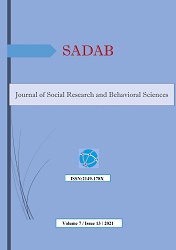Ahi Evran ve Ahilik Teşkilatının Emine Işınsu’nun Tasavvufî Romanlarındaki Yeri
Ahi Evran and Akhism in Emine Işınsu’s Sufistic Novels
Author(s): Üyesi Ece Serrican KabalcıSubject(s): Novel, Turkish Literature, The Ottoman Empire
Published by: SD Yayınevi
Keywords: Ahi Evran; Akhism; Bâcıyân-ı Rum; Emine Işınsu; novel;
Summary/Abstract: The founder of the Akhism is Sheikh Nasîrüddin Mahmûd, known as Ahi Evran, who was born in Hoy, Iran. Akhism is one of the formations that were effective in making Anatolia the homeland and the establishment of the Ottoman Empire. The Ahi organization, where Islamic-mystical thinking and living is valid, was called the union of tradesmen and craftsmen after the 18th century. The Ahi organization, based on honesty, trust, generosity and bravery; has become widespread in Anatolia because it creates order in the society, directs the economic life, and develops unity and solidarity. Emine Işınsu, who is one of the women writers of the Republican period and who mainly works in the genre of novel, has also written works called mystical novels-legendary novels. In her works called Hacı Bayram and Hacı Bektaş, which are among the Sufistic novels, she included Ahi Evran and the Ahi organization. Emine Işınsu conveyed information about the good virtues, their military success, their role in economic life and the functioning of the Ahi organization in Hacı Bayram novel. In her novel, Hacı Bektaş, she included Ahi Evran as a character of the novel. She also mentioned Bâcıyân-ı Rum, known as Anatolian Women, in both novels. In this study, it has been researched that which ways Emine Işınsu brought the Ahi organization together with the reader and how she fictionalized Ahi Evran as a novelist in her novels, Hacı Bayram and Hacı Bektaş. The data obtained were transferred in the form of quotations in the text, and complementary information was given about Ahi Evran and Akhism in the novels.
Journal: Sosyal Araştırmalar ve Davranış Bilimleri
- Issue Year: 7/2021
- Issue No: 14
- Page Range: 1-16
- Page Count: 16
- Language: Turkish

